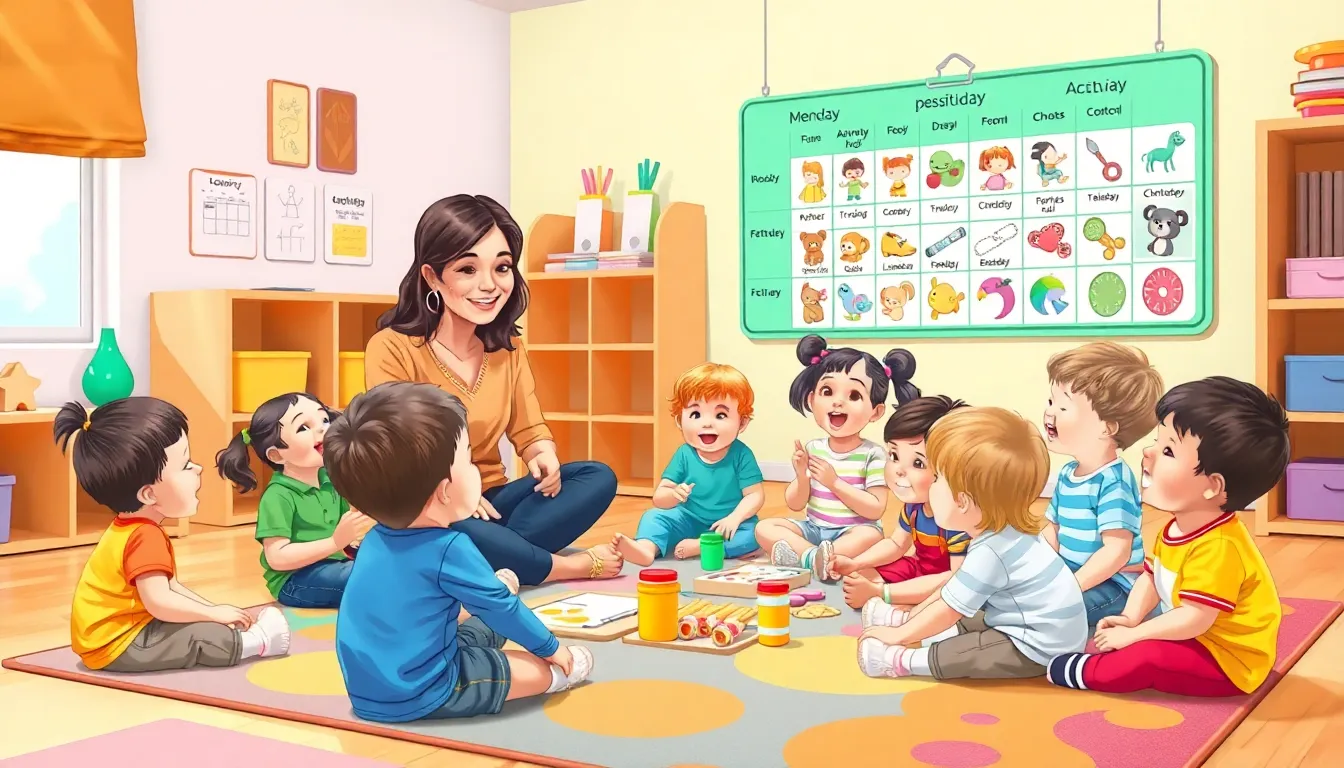Every parent knows that getting a preschooler to do anything can feel like herding cats. Yet establishing a solid preschool routine can turn that chaos into a symphony of smiles and learning. Routines aren’t just about keeping the little ones in line; they provide the structure kids crave while making parents’ lives a tad easier.
Imagine a world where mornings don’t start with a battle over shoes, and snack time doesn’t resemble a scene from a food fight movie. With the right routine, kids learn what to expect, boosting their confidence and independence. So let’s dive into the magic of preschool routines and discover how they can transform the daily grind into a delightful dance of discovery.
Importance Of Preschool Routines
Establishing preschool routines significantly benefits children and educators alike. Structured activities can lead to smoother days and enhanced learning experiences.
Benefits For Children
Children thrive on predictability, and routines create a sense of security. Daily schedules help them develop essential skills, such as time management and self-discipline. Familiar activities encourage independence, enabling children to navigate their environment confidently. Social skills improve as children learn to interact with peers during structured playtime. Engagement with educational tasks increases, laying a foundation for future academic success.
Benefits For Educators
Educators find that routines streamline classroom management. Consistent structures allow teachers to allocate time effectively, maximizing instructional periods. Understanding daily expectations helps reduce classroom disruptions, fostering a positive learning environment. Establishing routines also supports individualized learning by enabling teachers to identify each child’s needs more readily. Furthermore, these structures enhance communication with parents, ensuring everyone remains aligned in supporting children’s development.
Key Components Of Effective Routines

Effective routines include essential elements that enhance both learning and development in preschoolers. Key components, like daily schedules and transition strategies, create a stable environment conducive to growth.
Daily Schedules
Daily schedules typically outline a sequence of activities for preschoolers. Clearly defined time slots help children know what to expect throughout the day. Structured routines reduce anxiety, making children feel safe and secure. For instance, consistent meal times and play periods foster independence and initiative. Incorporating a variety of learning activities ensures engagement and promotes cognitive skills while catering to different learning styles. Parents notice that adhering to a daily schedule reinforces self-discipline.
Transition Strategies
Transition strategies are vital for helping preschoolers move from one activity to another smoothly. Teachers often use visual cues and verbal prompts to signal changes, thus easing anxiety related to transitions. Music, song, or storytelling makes this process more enjoyable. Engaging children in discussing what comes next prepares them for upcoming activities while establishing predictability. Frequent practice with transition routines encourages adaptability and strengthens their social skills, crucial for future learning experiences.
Incorporating Flexibility In Preschool Routines
Flexibility in preschool routines enhances adaptability and responsiveness to children’s evolving needs. Incorporating this flexibility invites an environment where learning feels natural.
Understanding Individual Needs
Preschoolers possess distinct personalities and preferences that shape their learning styles. Recognizing these individual needs fosters a tailored approach to routines. Each child’s development level influences how they engage with activities. Some children thrive in structured environments, while others benefit from open-ended exploration. Frequent assessments of these needs help caregivers and educators adjust routines accordingly, ensuring every child feels supported. By creating an inclusive atmosphere, children gain confidence and improve their social skills, resulting in richer learning experiences.
Adapting To Changes
Life’s unpredictability requires preschool routines to remain adaptable. Changes in a child’s mood, energy levels, or external factors like weather or family events often arise. Acknowledging these fluctuations allows caregivers to modify activities seamlessly. Implementing flexible strategies, like adding short breaks or switching activities based on children’s responses, keeps engagement high. Emphasizing communication with children about these changes strengthens their understanding of the routine’s fluidity. When adaptability becomes integral to the routine, children learn to navigate life’s uncertainties, fostering resilience and problem-solving skills. They experience a routine that supports their growth while remaining responsive to their immediate needs.
Challenges In Implementing Routines
Implementing preschool routines presents challenges for parents and educators. Recognizing these obstacles enables the development of effective solutions.
Common Obstacles
Disruptions can occur due to unforeseen circumstances, like illness or family obligations. Inconsistent sleep schedules complicate the establishment of a stable routine. Different learning styles among children can create friction when trying to maintain a unified approach. Behavioral issues may arise during transitions, disrupting the flow of activities. Limited resources, such as time or materials, can hinder routine effectiveness. Change resistance from children may further intensify these challenges, making it difficult to achieve a productive atmosphere.
Solutions And Best Practices
Adapting routines to suit individual needs allows for improved engagement and cooperation. Establishing clear and consistent expectations sets a positive tone for children. Incorporating visual schedules aids in helping children understand transitions more effectively. Utilizing positive reinforcement reinforces desired behaviors and encourages participation in routines. Regular communication with parents fosters a collaborative environment, aligning expectations at home and school. Staying flexible while maintaining structure creates a supportive atmosphere where children can thrive.
Establishing preschool routines is essential for fostering a nurturing environment where children can thrive. These routines not only provide structure but also empower children with the confidence and skills they need for future success. By recognizing the importance of flexibility and adaptability within these routines, caregivers can better meet the individual needs of each child.
Implementing effective strategies like visual schedules and positive reinforcement can significantly enhance the preschool experience. With the right approach, parents and educators can transform daily challenges into opportunities for growth and learning. Ultimately, a well-structured routine lays the groundwork for a child’s independence and social development, setting them on a path toward lifelong learning.
